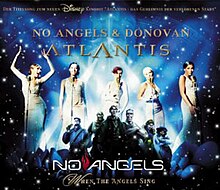
No Angels are an all-female pop group from Germany, formed in 2000. Originally a quintet, consisting of band members Nadja Benaissa, Lucy Diakovska, Sandy Mölling, Vanessa Petruo, and Jessica Wahls, they originated on the debut season of the German adaptation of the talent series Popstars and were one of the first television-cast acts to achieve sustainable success throughout Central Europe in the early 2000s. Following a major success with record-breaking single "Daylight in Your Eyes" and debut album Elle'ments in 2001, a series of hit records established their position as one of the most successful female band vocalists to emerge in the early decade. With four number-one hits, four number-one albums and record sales of more than 5.0 million, they became one of the most successful acts in German music history, winning three ECHOs, a World Music Award, a NRJ Music Award, two Comets, a Bambi and a Goldene Kamera.

Barabajagal is the seventh studio album and eighth album overall from British singer-songwriter Donovan. It was released by Epic Records in the United States on 11 August 1969, but was not released in the United Kingdom because of a continuing contractual dispute that also prevented Sunshine Superman, Mellow Yellow, and The Hurdy Gurdy Man from being released in the UK.
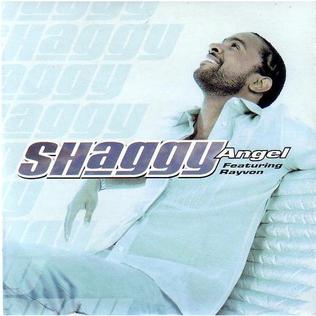
"Angel" is a song by Jamaican reggae artist Shaggy featuring additional vocals from Barbadian singer Rayvon. Containing samples from Steve Miller Band's "The Joker" and the Chip Taylor-written "Angel of the Morning", it was released to radio on 9 January 2001 as the follow-up to Shaggy's international number-one hit, "It Wasn't Me". "Angel" also proved to be successful, reaching number one in 12 countries, including Australia, Germany, Ireland, the United Kingdom, and the United States.
"Barabajagal" is a song by British singer/songwriter Donovan Leitch, released by Donovan in 1969. It was later used as title track to the album Barabajagal. The instrumental backing is provided by The Jeff Beck Group, with backing vocals by Lesley Duncan, Suzi Quatro and Madeline Bell.
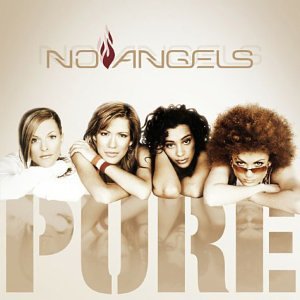
Pure is the third studio album by all-female German pop group No Angels. It was released by Cheyenne Records and Polydor on 25 August 2003. Conceived after the departure of original member Jessica Wahls, the project marked No Angels's first studio release as a quartet and their final album before their temporary disbandment in fall 2003. The remaining four members reteamed with frequent collaborators Thorsten Brötzmann and Peter Ries to work on the majority of the album, with additional songwriting and production contribution from Tobias Lundgren, Perky Park, Nigel Rush, Stephan Ullman, and Twin.

Now... Us! is the second studio album by German girl group No Angels. It was released by Polydor and Cheyenne Records on June 24, 2002, in German-speaking Europe. Recorded after the release of the band's majorly successful debut album Elle'ments (2001), the group consulted work by frequent collaborators Thorsten Brötzmann, Peter Ries, and Leslie Mándoki as well as international songwriters and producers such as Anders Bagge, Figge Boström, Dennis Dowlut, Mousse T., Pontus Söderqvist, and Quiz & Larossi, while taking a wider role in contributing own lyrics and melodies to the album.
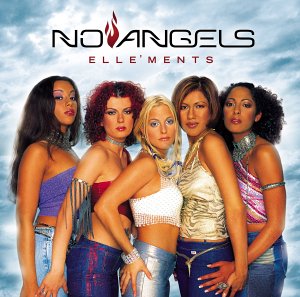
Elle'ments is the debut studio album by German girl group No Angels. It was first released by Polydor–Zeitgeist and Cheyenne Records on 12 March 2001 in German-speaking Europe. After winning the inaugural season of the reality talent contest Popstars in late 2000, Polydor consulted a small team of German-based musicians to work with the quintet, including Thorsten Brötzmann, Peter Ries, Leslie Mándoki, and Peter Plate. Elle'ments is a pop record with an inclusion of styles such as dance, R&B, Latin and rock. Conceptually, the album centered on the idea of the classical elements, and during that time was compared to English girl group the Spice Girls' Forever (2000) era.

The Best of No Angels is a compilation album by German girl group No Angels. It was released by Polydor–Zeitgeist and Cheyenne Records on 1 December 2003 in German-speaking Europe, coinciding with the group's first disbandment. A best-of album, it features all the singles from their first three studio albums Elle'ments (2001), Now... Us! (2002) and Pure (2003), as well as three additional album cuts from each album, including production from Thorsten Brötzmann, Leslie Mándoki, Mousse T., Perky Park, Peter Plate, Peter Ries, Ulf Leo Sommer, and Twin.
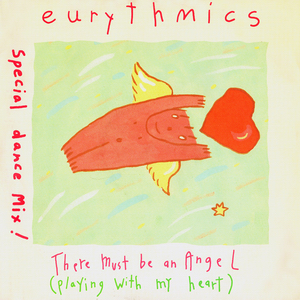
"There Must Be an Angel (Playing with My Heart)" is a song by the British musical duo Eurythmics, released as the second single from their fifth studio album, Be Yourself Tonight (1985). It features a harmonica solo by American musician Stevie Wonder. The song became a worldwide success; most notably in Ireland, Norway and the United Kingdom, where it remains the duo's only chart-topper.

"Still in Love with You" is a song performed by German group No Angels. Penned and composed by Figge Boström and Johan Lindman of Swedish songwriting collective La Carr, it was co-produced by Pontus Söderqvist and Nick Nice for the band's second studio album Now... Us! (2002). A mid-paced latin pop ballad, it showcases a more mature side from the band, with its instrumentation consisting essentially of flamenco guitars and bongo drums. Lyrically, the track finds the female protagonist thinking deeply over her relationship with her love interest from whom she parted; however, she still pines for him and feels self-conscious for doing so.

The discography of German girl group No Angels consists of six studio albums, three compilation albums, two live albums, four video albums and more than twenty singles. The group sold over five million records before breaking up in 2003, making them one of the highest-selling German girl groups of all time.

"Daylight in Your Eyes" is the debut single by German girl group No Angels. It was written by Tony Bruno and Tommy Byrnes and initially recorded by American rock band New Life Crisis. A Tony Moran-produced remix of their version appeared on the MTV Party to Go Remixed compilation album (2001), but as their record company, Tommy Boy Entertainment, folded soon after, the group's original recording failed to receive a wider release, and the song was eventually sold separately abroad. There, "Daylight in Your Eyes" was purchased by Epic Records and re-recorded by the singer Victoria Faiella for her debut album with the label.
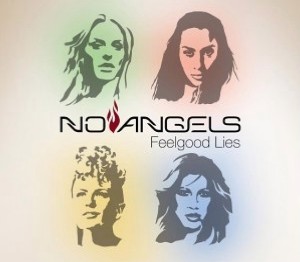
"Feelgood Lies" is a song by all-female German pop band No Angels. It was written by Pelle Ankarberg, Charlie Dore, Niclas Molinder, Maryann Morgan and Joacim Persson for the group's third studio album Pure (2003), while production was helmed by Molinder and Persson under their production moniker Twin, with Ankarberg serving as co-producer. A dark urban dance pop song that is built upon a heavy guitar riff and uplifting strings, the subjects of "Feelgood Lies" are revenge and karma. Not wanting to feel broken-hearted, the female protagonist warns a love interest to check his alibis.

"Rivers of Joy" is a song recorded by all-female German pop group No Angels. It was written by Hans Andersson and Niklas Petterson from Swedish composing duo Petterson & Haze and recorded by the band for their debut studio album, Elle'ments (2001). Production on the track was helmed by German musician Peter Ries. An anthemic song about self-empowerment, the dance-pop track combines elements of gospel music and eurodance with prominent usage of a piano sample.

"When the Angels Sing" is a song recorded by German pop group No Angels. It was written by Peter Ries and Charlemaine Thomas-Schmidtner and produced by the former for the band's debut studio album, Elle'ments (2001). A midtempo pop ballad, "When the Angels Sing" features a cascading piano arrangement and dominant drum pattern. Lyrically, it finds the group, as the protagonists, thinking deeply over their relationship with their love interests from whom they parted, still pining for them.
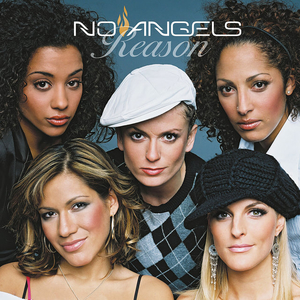
"Reason" is a song by German girl band No Angels. It was written by Thorsten Brötzmann and Alexander Geringas and produced by the former for their debut studio album Elle'ments (2001). "Reason" is a piano-led pop ballad with soft string arrangements and lyrics that talk about reminiscing past memories with a loved one. One of the slower songs on the album, its original version, entitled "That's the Reason", served as the closing track on both the original version of Elle'ments as well as its Special Winter deluxe edition.

"All Cried Out" is a song by English singer-songwriter Alison Moyet, which was released in 1984 as the second single from her debut studio album Alf. It was written by Moyet and producers Jolley & Swain. The song peaked within the top ten on both the Irish and the UK Singles Chart, and also reached the top twenty in Switzerland.
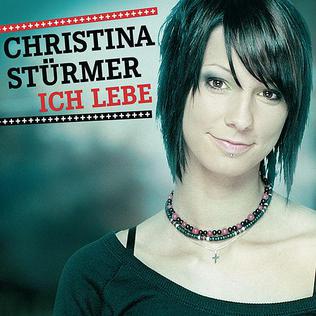
"Ich lebe" is a song by Austrian recording artist Christina Stürmer. It was written by Alexander Kahr, Eva Kraus, Harald Hanisch, and Leopold Zillinger for her debut studio album Freier Fall (2003), while production was helmed by the former. Recorded after her participation in the ORF 1 talent show Starmania, where Stürmer had finished runner-up, it was released by Polydor Records on 24 March 2003 in Austria, where it debuted at number-one on the Austrian Singles Chart and remained atop for another seven weeks.

"Vivo per lei" is a 1995 song recorded by Italian artist Andrea Bocelli as duet with Giorgia Todrani for his album Bocelli. The song was also released as a duet with other female artists, including Marta Sánchez in Spanish and Latin American countries; Hélène Ségara in francophone countries; Judy Weiss in German-speaking countries; Sandy in Brazilian Portuguese; and Bonnie Tyler in English under the title "Live for Love", though due to record company disputes their version was never released.

"Atlantis Is Calling " is a song by German pop duo Modern Talking, released as the second single from their third studio album, Ready for Romance (1986). It is the duo's fifth and final consecutive single to reach No. 1 on the German Singles Chart. "Atlantis is Calling " was released in Germany and in other European territories on 28 April 1986, it peaked at No. 1 in Germany on 16 June 1986 after spending two weeks at No. 2 position. The single spent four weeks at the top and total of 14 weeks on the top 100. While "Atlantis Is Calling " entered the top five in Switzerland, Austria and Sweden, it managed to chart within the top 10 in the Netherlands and Norway.


